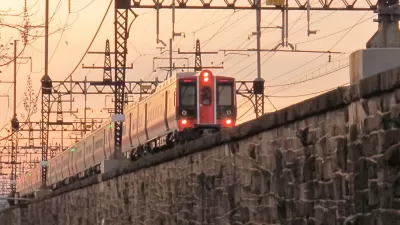"Intelligent cities" is picking up steam as the new buzzword in planning and a potentially game-changing way of using data to drive decisions. But we need to be sure we don't lose the human intelligence in planning.
Next American City's Julia Ramey Serazio points out that "Intelligent Cities" is the newest trend in new urbanism, and it has a lot of merit:
"'Intelligent cities,' the new darling lingo of planners, reflects the times. It captures the essence of 21st-century technology that can help track when and how many people cross a street, water and energy consumption and peak hours at every transit stop. It also will soon allow bidding on a parking space via cellphone (the space goes to the highest bidder)."
But there's a risk that planners will become too reliant on this technology. Serazio calls for moderation and a diversity of approaches, pointing out the dangers of moving too fast and too completely in the direction of Intelligent Cities - from losing the feedback of citizens without cellphones to increasing injustice and inefficiency in community decisions.
FULL STORY: Let's Be Smart About Intelligent Cities

Manufactured Crisis: Losing the Nation’s Largest Source of Unsubsidized Affordable Housing
Manufactured housing communities have long been an affordable housing option for millions of people living in the U.S., but that affordability is disappearing rapidly. How did we get here?

Americans May Be Stuck — But Why?
Americans are moving a lot less than they once did, and that is a problem. While Yoni Applebaum, in his highly-publicized article Stuck, gets the reasons badly wrong, it's still important to ask: why are we moving so much less than before?

Using Old Oil and Gas Wells for Green Energy Storage
Penn State researchers have found that repurposing abandoned oil and gas wells for geothermal-assisted compressed-air energy storage can boost efficiency, reduce environmental risks, and support clean energy and job transitions.

Greening Oakland’s School Grounds
With help from community partners like the Trust for Public Land, Oakland Unified School District is turning barren, asphalt-covered schoolyards into vibrant, green spaces that support outdoor learning, play, and student well-being.

California Governor Suspends CEQA Reviews for Utilities in Fire Areas
Utility restoration efforts in areas affected by the January wildfires in Los Angeles will be exempt from environmental regulations to speed up the rebuilding of essential infrastructure.

Native American Communities Prepare to Lead on Environmental Stewardship
In the face of federal threats to public lands and conservation efforts, indigenous groups continue to model nature-centered conservation efforts.
Urban Design for Planners 1: Software Tools
This six-course series explores essential urban design concepts using open source software and equips planners with the tools they need to participate fully in the urban design process.
Planning for Universal Design
Learn the tools for implementing Universal Design in planning regulations.
Heyer Gruel & Associates PA
City of Moreno Valley
Institute for Housing and Urban Development Studies (IHS)
City of Grandview
Harvard GSD Executive Education
Salt Lake City
NYU Wagner Graduate School of Public Service
City of Cambridge, Maryland



























